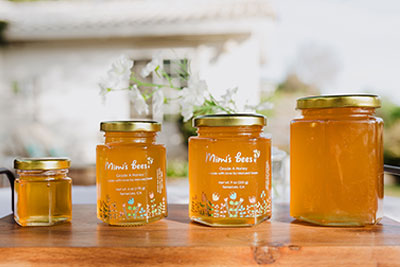Temecula, CA
Premium raw local honey direct to you from the beekeeper!
Raw local honey is honey that has been harvested directly from beehives in your local area, and has not been processed or heated in any way. Because it has not been processed, it retains all of its natural enzymes, vitamins, and minerals, which can provide a number of health benefits. Some of the potential benefits of raw local honey include:
Raw local honey for allergies: Raw local honey contains small amounts of the same pollen that causes seasonal allergies in your area. By consuming small amounts of this honey, you can help to build up a tolerance to the allergens and reduce your symptoms.
Wound healing: Raw honey has natural antibacterial and antifungal properties, which can help to prevent infection and promote healing.
Energy: Honey is a natural source of carbohydrates, which can provide a quick boost of energy when you need it.
Digestion: Raw honey contains beneficial enzymes that can help to improve your digestion and support a healthy gut. It’s important to note that the potential benefits of raw local honey may vary depending on the specific honey and the region where it was harvested. It’s also important to make sure you’re purchasing your honey from a reputable source to ensure that it is truly raw and unprocessed.
Adulterated honey is honey that has been mixed with other substances, such as corn syrup, sugar, or water. This is done to stretch the honey and make it go further, or to lower the cost of production. Adulterated honey may not provide the same health benefits as pure, unadulterated honey, and in some cases it may even be harmful. In order to ensure that you’re getting pure, unadulterated honey, it’s important to purchase your honey from a reputable source and to read the label carefully to make sure it does not contain any added ingredients.
There are several ways to tell if honey has been adulterated or is not pure. Here are a few things to look for:
- Water content: Pure honey has a moisture content of around 18%, which is too low for bacteria to grow. If the honey has a higher water content, it may have been diluted with water or other substances.
- Texture and consistency: Pure honey is thick and viscous, while adulterated honey may be thinner and more liquid.
- Crystallization: Pure honey will crystallize over time, but the rate of crystallization can vary depending on the type of honey. If the honey crystallizes very quickly or has a grainy texture, it may have been mixed with other substances that cause it to crystallize more quickly.
- Taste and aroma: Pure honey has a distinct flavor and aroma that is characteristic of the type of flower from which the nectar was collected. If the honey has a bland or artificial taste or aroma, it may have been mixed with other substances.
- Lab testing: One of the most accurate ways to determine the purity of honey is to have it tested in a laboratory. Lab tests can identify the presence of contaminants or additives in the honey and can provide a more accurate assessment of its quality.
It is important to note that adulterated honey is not necessarily unsafe to consume, but it may not have the same nutritional value or taste as pure honey. To ensure that you are getting the highest-quality honey, it is best to buy from local beekeeper or reputable source.
Still have questions about raw local honey? Check our honey FAQ or visit the National Honey Board website.
Updated December 21, 2022

